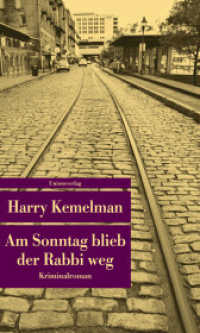Full Description
Informal relations have been one of the major research topics of the social sciences since the 1990s. In order to allow for meaningful comparisons between different combinations of the positive and negative effects of informal relations on democratic representation, all the articles in this book focus on post-socialist Central and Eastern Europe as a particular region where formal democratic rules have been established but competing informal rules are still strong. The first section discusses a broad spectrum of related analytical concepts from different perspectives and from different academic disciplines. The second part then goes on to analyse empirical cases of the relationship between informal relations and democratic representation. The contributions span the whole continuum, as we perceive it, from civil society networks seen as supporting democratic representation to the perversion of democratic representation through political corruption. The final part of the book then takes a closer look at corruption through four case studies from Russia. This book presents a selection of the papers discussed at the Changing Europe Summer School on 'Informal Networks, Clientelism and Corruption. Case Studies from Central and Eastern Europe' held in Prague at the Institute of Sociology of the Academy of Sciences of the Czech Republic in August 2010.
Contents
List of Figures List of Tables Preface 1. Introduction, by Heiko Pleines Part I. Concepts 2. Basic Public Services and Informal Power: An Analytical Framework for Sector Governance, by Eelco Jacobs 3. Conflict of Interest as a Research-Analytical Category, by Piotr Stankiewicz and Stanislaw Burdziej 4. Evaluating the Harmonization of Criminal Provisions on Corruption in Central and Eastern Europe, by Marco Zanella 5. Understanding Post-Soviet Petty Corruption. Informal Institutions, Legitimacy, and State Criticism, by Mi Lennhag Part II. Personal Relations and Democratic Representation 6. Civil Society and the Legitimacy of the EU Polity. Using Network Analysis to Analyse Linkages Among Actors, by Petra Guasti 7. Patterns of Inter-Organizational Collaboration of Nonprofits in Central Europe, by Tomasz Gabor 8. Successor Parties and Trade Unions in the Post-Communist States. Institutionalizing Informal Relationships, by Veronika Pasynkova 9. 'Ethno-Business'. The Unexpected Consequence of National Minority Policies in Romania Andreea Carstocea 10. If You Ignore It, It Will (Not) Go Away. Exploring How and Why the International Community Turned a Blind Eye to Corruption in Bosnia-Herzegovina and Kosovo, by Maja Nenadovi? Part III. Everyday Corruption in Russia 11. Informal Practices in Russia. State Influence on Foreign Companies Operating in Russia, by Elena Denisova-Schmidt 12. Academic Corruption in Russia, by Eduard Klein 13. Informal Ways of Obtaining Grades in Modern Russian Universities. How Daily Ties Become Corruption Networks, by Elvira Leontyeva 14. Modern Russian Homeowners' Associations as Res Publicae. The Relationship between Commonwealth and Corruption, by Dilorom Akhmedzhanova Bibliography About the Authors







